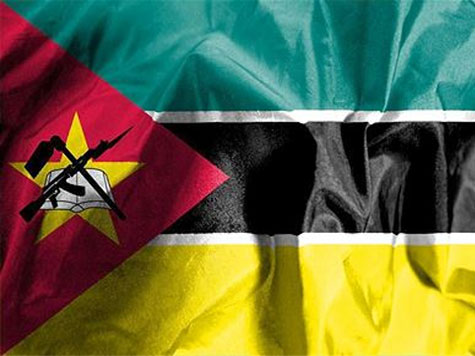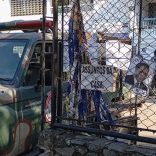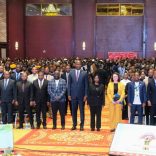Mozambique: RD denies that Singano has been murdered - AIM report
How economic challenges led to “a redefinition of priorities” in Mozambique – Nyusi

Mozambican President Filipe Nyusi on Monday blamed the international economic and financial crisis for “corroding our resilience to external shocks, and negatively affecting national production”.
The country was put to the test in 2016 when it was struck by severe drought, caused by the El Nino weather phenomenon. The drought destroyed 18 per cent of the areas sown with crops, said Nyusi, giving his annual state of the Nation address to the country’s parliament, the Assembly of the Republic, directly affecting more than 460,000 households.
Thousands of head of livestock succumbed to the drought, he added, and 1.5 million people were plunged into food insecurity in the southern and central provinces.
Nyusi argued that the fall in the international prices of key Mozambican exports in the first part of the year, notably coal, natural gas, cotton and sugar, hit Mozambique’s export earnings and its net international reserves.
There was also a reduced flow of foreign direct investment, and of commercial credit to the private sector.
On top of this came the suspension of direct support to the Mozambican state budget by the 14 donors and financing agencies who have normally provided budget support, The suspension of this aid, Nyusi said, cost Mozambique about 477 million US dollars.
“This demanded from us robust measures to redraw our strategies”, said Nyusi. “Above all it demanded a redefinition of priorities”.
Mozambique’s partners suspended their aid because well over a billion dollars worth of loans to the security- related companies Proindicus and MAM (Mozambique Asset Management), illicitly guaranteed by the previous government, headed by President Armando Guebuza, had not been disclosed, either to the Mozambican public or to the International Monetary Fund (IMF). The IMF and other partners have demanded an international, independent audit of these companies and of the Mozambique Tuna Company (Ematum) before relations can return to normal.
Nyusi said that the audit, headed by the Attorney-General’s Office, and involving the US company Kroll, regarded as the foremost forensic auditor in the world, plus the Commission of Inquiry into the loans set up by the Assembly of the Republic, “will allow us all to learn how the loans contracted were used. The results of this audit will also contribute to improving the management of the public debt and strengthening public transparency”.
The President added that it was a government priority to bring the debt to sustainable levels. Even when the Ematum, Proindicus and MAM loans are excluded, debt servicing has risen ominously. It was 15.1 billion meticais (about 213 million US dollars, at current exchange rates) in 2016, but will be 26.1 billion meticais in 2017. This is a rise from 2.2 to 3.4 per cent of Mozambique’s Gross Domestic Product.
This rise is because various bilateral loans contracted to build infrastructure are now coming up for repayment. When expressed in meticais, the repayment soars because of the sharp depreciation of the metical over the past year.
Nyusi said the government wants to “adjust” the commercial debt service (essentially the Ematum, Proindicus and MAM loans), bringing it more into line with the bilateral and multilateral debt. It has therefore embarked on negotiations with the creditors.
In a meeting with creditors in London in late October, the Ministry of Economy and Finance admitted that the debt was now unsustainable, mainly because of Ematum, Proindicus and MAM. There was no money available to meet the debt service on these three loans, hence the urgency of restructuring the payment terms.
Nyusi told the Assembly that the cost of living had risen sharply, largely because “our country continues to import most of its consumer goods”, and when their prices rise, due to the impact of the depreciation of the metical, inflation increases.
The government had tried to protect the most vulnerable strata of society by a series of subsidies, notably on the wheat flour used to bake bread, on the fuel used in public transport, and on water and electricity (the recent water and electricity price rises do not affect the “social tariff” paid by poor households).
The subsidies “have not been easy”, said Nyusi, “and are not a common practice in many other countries going through the same difficulties”.
But the President insisted that the long term solution to the country’s economic difficulties lies in increasing production. “Only be producing more and better can we be less exposed to the vulnerability of the exchange rate”, he said.
The 2016/2017 agricultural campaign would be crucial, Nyusi added. “All of us – government, producers, civil society – are called upon to affirm our country as a nation which produces to feed itself and to export”, he said. “We must look at agriculture as the sector which can contribute rapidly to an increase in household income, and to reducing the cost of living”.













Leave a Reply
Be the First to Comment!
You must be logged in to post a comment.
You must be logged in to post a comment.